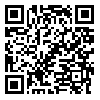BibTeX | RIS | EndNote | Medlars | ProCite | Reference Manager | RefWorks
Send citation to:
URL: http://dsme.hums.ac.ir/article-1-503-en.html
Introduction: E-learning is increasingly important as a solution to increase access and flexibility in higher education. This study aims to identify factors affecting the policy development of e-learning in universities, and presents a conceptual model with a Grounded Theory approach based on the conditions of Iranian universities to provide a better understanding for stakeholders.
Methods: This qualitative research was conducted in 1401 using the Corbin & Strauss approach. The study population consisted of 15 experienced academic professors and experts in e-learning. The selection of participants was initially purposive and then completed with the snowball method. The data required for the study were collected through semi-structured interviews and data analysis was performed using MAXQDA software. The aim of the study was to identify key policy factors and their consequences, such as improving the effectiveness and sustainability of education.
Results: Policy development of e-learning was identified as a central phenomenon. Causal conditions included the benefits of e-learning, organizational factors, collaboration, content, paradigm shift requirements, and barriers. Contextual conditions included university management, post-COVID challenges, education promotion, financial resources, organizational culture, and human resource development. Intervening conditions included planning, up-to-date education, university participation, and effective criticism. Strategies included policy management, culture building, innovation, professional development, quality improvement, inter-organizational relations, and financial management.
Conclusion: The development of e-learning in universities is a bureaucratic process that requires attention to stakeholders and infrastructure. The proposed model is comprehensive and designed to suit the conditions of universities, and its implementation can facilitate the development of e-learning and bring its benefits
Received: 2025/03/13 | Accepted: 2025/04/15 | Published: 2025/06/20
| Rights and permissions | |
 |
This work is licensed under a Creative Commons Attribution-NonCommercial 4.0 International License. |









